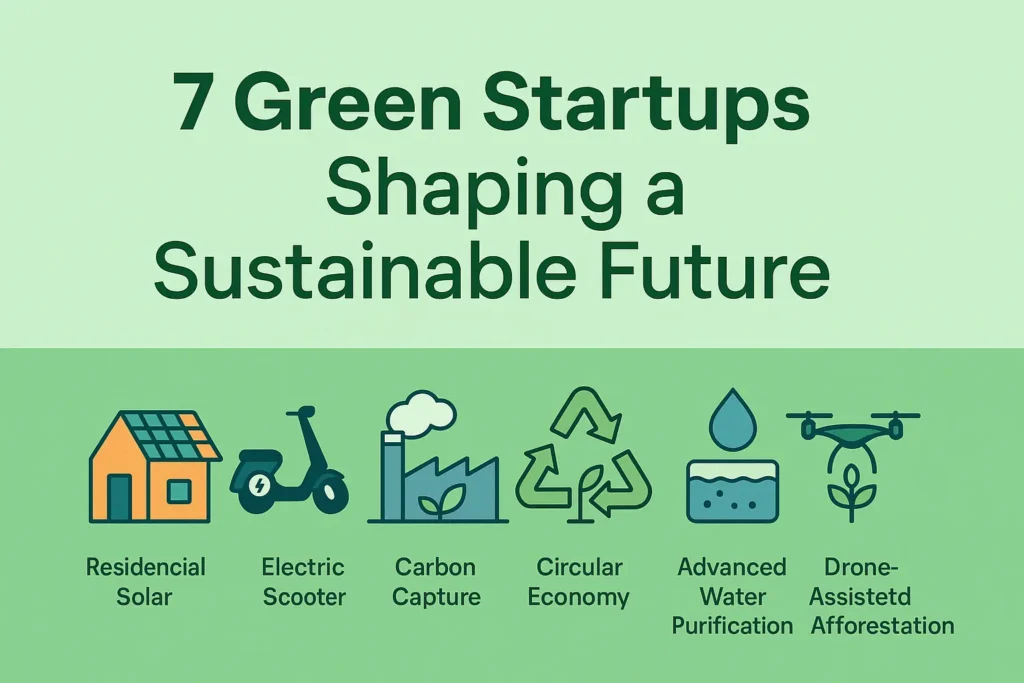7 Green Startups Shaping a Sustainable Future
Green startups are driving innovation across sectors to build a more sustainable world. These companies apply cutting-edge technology to climate challenges, from solar power to carbon capture. Below, we explore seven sectors where green startups are making a tangible impact today.
1. Green Startups in Residential Solar Solutions
Green startups focusing on solar are making rooftop power affordable and scalable. For example, Indian startup SolarSquare raised $40M to install residential solar panels, powering over 20,000 homes with guaranteed performance. This surge in rooftop adoption is critical: only about 1% of Indian households have solar today (versus 35% in Australia), highlighting immense growth potential. With government incentives (tax breaks, subsidies, net-metering rights) and venture funding solar-focused green startups are expanding clean energy access in cities and suburbs.
2. Green Startups in Electric Micro-Mobility Innovations
Electric micro‑mobility is transforming urban transport, and green startups are at the forefront. The global micro-mobility market is already ~$5.05 billion in 2025 and projected to exceed $15 billion by 2034. Startups like India’s World of River are riding this wave: River makes high-quality e-scooters for city commuters and recently secured Yamaha Motor investment in its Series B round. These scooters compete in “the world’s largest market for electric two-wheelers” (India). Similar green mobility firms in the U.S. and Europe are advancing e-bikes, e-mopeds and shared scooters. As infrastructure for charging expands, such green startups are reducing urban pollution and moving cities toward net-zero transport.
3. Green Startups in Carbon Capture Technologies
Green startups in carbon capture are tackling CO₂ emissions with novel tech. Israeli startup RepAir Carbon, for instance, raised $15 million (Series A extension) to commercialize a reversible capture process inspired by batteries. RepAir claims it can slash capture costs to about $70-$80 per ton of CO₂. Meanwhile, Swiss startup Climeworks is scaling direct air capture (DAC) at gigaton potential: its new “Mammoth” plant (launched 2024) can capture ~36,000 tons of CO₂ per year, ten times more than their earlier Orca plant. These and other green startups (e.g. Global Thermostat, Heirloom) are critical for removing legacy emissions from the atmosphere, complementing emission cuts.
4. Green Startups in Circular-Economy & Waste-to-Resource
Circular economy startups convert waste into new resources. For example, Novoloop (USA) closed a $21 million Series B to scale its “Lifecycling” technology, which upcycles waste polyethylene into high-performance materials (polyols and polyurethanes) for sneakers and plastics. Novoloop’s processes mean discarded plastic becomes next-generation shoe soles or insulation instead of pollution. In the UK, Bio-bean tackles another waste stream: this green startup recycles spent coffee grounds into biomass fuel pellets, processing over 30,000 tons of coffee waste per year and avoiding methane emissions from landfill. Other circular startups (e.g. Carbios, Pivot Bio, Trashbot) are turning plastic, agricultural, and food waste into fuel, compost or chemicals, closing material loops and cutting landfill.
5. Green Startups in Advanced Water Purification & Desalination
Water-tech startups are innovating purification and desalination. London’s G2O Water, for example, is commercializing a graphene-based membrane additive that retrofit traditional filters to cut their energy use by 80-90%. Solar-driven systems are also advancing: MIT engineers developed a battery-free solar desalination unit that produced ~5,000 liters of clean water per day while capturing ~94% of solar energy. This approach avoids expensive batteries and boosts yield under fluctuating sunlight. Such innovations combining nanomaterials, AI controls, and renewable energy are enabling sustainable water treatment, making fresh water generation more efficient and affordable for arid regions.
6. Green Startups in AI-Driven Recycling & Wastewater Treatment
AI and automation are powering smarter waste treatment. Green startups like Glacier (USA) deploy AI-equipped robots to sort recyclables: Glacier’s machines can match human sorters and capture about 80 – 90% of targeted plastics on a conveyor belt. These systems use computer vision to identify and pick items, dramatically improving recycling plant throughput. Meanwhile, AI analytics are applied to wastewater. For instance, industry reports show that intelligent sensor algorithms in water utilities can save massive volumes of water SUEZ projects saving over 33 million cubic meters by 2024 by optimizing treatment processes. Though many water treatment operators are established firms, new AI startups (in partnership with cities) are emerging to predict equipment failures, balance chemical dosing, and turn wastewater into reusable resource with minimal waste.
7. Green Startups in Drone-Assisted Afforestation
Drones are now planting trees. Companies like Flash Forest (Canada) and AirSeed (Australia) use UAVs with GPS and seedpods to reforest areas faster than human teams. For example, Flash Forest has already planted over 2.9 million trees across North America using drone swarms and AI-driven site selection. AirSeed’s technology can shoot up to 250,000 seed pods per day in hard to reach terrain. These green startups can rapidly establish young forests on deforested land, boosting carbon capture and restoring ecosystems. Together with satellite monitoring, drone afforestation firms allow nations and NGOs to scale reforestation projects efficiently, an essential complement to traditional tree-planting efforts.
Conclusion
In conclusion, green startups across diverse sectors – energy, mobility, carbon capture, waste management, water, AI, and drones are pioneering innovations that make sustainability practical and scalable. By integrating clean tech with data and novel business models, these companies are not only reducing emissions and resource use today, but also laying the groundwork for global sustainability. Looking forward, such green startups will continue shaping policy and industry, accelerating the transition to a circular, low-carbon economy worldwide. Together, they exemplify how entrepreneurship and technology can lead the world toward a greener future.
Sources: Verified industry reports and news articles, among others.
More in Business Insider
